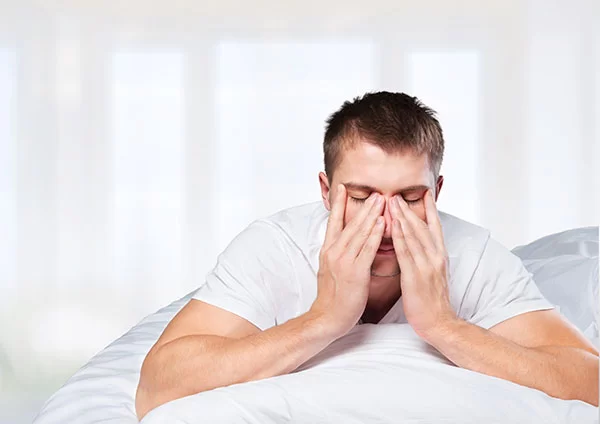How Lifestyle Changes Can Help Ease Sleep Apnea Symptoms
Disrupted sleep and constant fatigue are some of the most common frustrations for those suffering from sleep apnea. While CPAP machines are widely recommended treatment, many patients find them cumbersome and challenging to use. Fortunately, in some cases of sleep apnea, certain lifestyle changes can significantly reduce symptoms and improve sleep quality.
To learn more about the latest sleep apnea treatment options in Hilliard, OH, contact our Hilliard dental office at (614) 771-6060!

What Is Sleep Apnea?
Sleep apnea is a disorder characterized by repeated interruptions in breathing during sleep. These interruptions, or apneas, can occur multiple times throughout the night, leading to poor sleep quality and other health issues such as daytime fatigue, mood disturbances, and cardiovascular strain. The most common form of sleep apnea is obstructive sleep apnea (OSA), where the airway becomes blocked during sleep due to relaxed muscles in the throat.
The Importance of Seeking Treatment
Untreated sleep apnea can have serious health consequences, including an increased risk of cardiovascular disease, diabetes, and impaired cognitive function. However, with effective treatment, sleep apnea patients can see a marked improvement in their quality of life, from better sleep to enhanced daytime productivity.
Lifestyle Changes
Weight Management
Obesity is a significant risk factor for sleep apnea, as fat deposits around the neck can obstruct the airway during sleep. By adopting a healthy diet rich in anti-inflammatory foods like vegetables, fruits, and whole grains, along with regular exercise, patients may see a reduction in apnea severity. New research emphasizes the benefits of an anti-inflammatory diet in reducing symptoms of OSA.
Exercise
While weight loss through physical activity is crucial, consider incorporating yoga and throat exercises to strengthen muscles in the upper airway. These practices help reduce airway collapse and promote more consistent breathing during sleep. Activities such as brisk walking, swimming, or yoga can be particularly beneficial.
Sleep Position
The way you sleep affects the severity of sleep apnea symptoms. Positional therapy—using specially designed pillows or devices to maintain side sleeping—has shown to be effective in preventing airway obstruction, particularly for patients who tend to sleep on their backs.
Avoid Alcohol and Sedatives
Alcohol and sedatives relax the muscles in the throat, which can worsen sleep apnea symptoms. Reducing or eliminating their consumption can significantly improve sleep quality. Some healthcare professionals may suggest exploring cognitive behavioral therapy (CBT) and stress management techniques to further support relaxation without compromising breathing.
Quit Smoking
Smoking increases inflammation and fluid retention in the upper airway, both of which exacerbate sleep apnea. By quitting smoking, patients can reduce airway inflammation and improve their overall health.
Develop a Consistent Sleep Schedule
Establishing a regular sleep routine can improve your body’s internal clock and help regulate sleep patterns. Going to bed and waking up at the same time every day is key to managing sleep apnea and ensuring a restful night’s sleep.

Benefits of Lifestyle Changes for Sleep Apnea
Implementing these lifestyle changes can provide significant benefits:
- Improved Sleep Quality: Reduced apnea events lead to deeper, more restful sleep.
- Enhanced Daytime Alertness: Better sleep leads to improved focus and productivity.
- Lower Health Risks: Lifestyle changes can reduce risks of heart disease, high blood pressure, and type 2 diabetes.
- Reduced Dependence on CPAP: Some patients may reduce or even eliminate the need for CPAP by making these adjustments.
- Better Mood and Quality of Life: Improved sleep reduces irritability and increases overall well-being.
If you’re looking for a custom treatment plan for sleep apnea, contact our dental office in Hilliard today by calling (614) 771-6060.
Frequently Asked Questions
Can sleep apnea affect my daily productivity?
Yes, as sleep apnea can lead to daytime drowsiness, difficulty concentrating, and irritability. Untreated sleep apnea can hinder your ability to make the most of your day.
Is snoring always a sign of sleep apnea?
Not necessarily, but loud and persistent snoring can be a symptom of obstructive sleep apnea. If snoring is accompanied by symptoms like daytime fatigue, it’s a good idea to consult a specialist for an evaluation.
Discover a Path to Better Rest
Sleepless nights leaving you exhausted? You don’t have to suffer from sleep apnea anymore. Take control of your health and start getting the restful sleep you deserve. Experience the difference restful sleep can make in your energy, focus, and quality of life.
Don’t put it off another day -— call our Hilliard dental office at (614) 771-6060 now to schedule your free consultation. We proudly serve patients from Columbus, Dublin, Upper Arlington, Grove City, Westerville, and nearby communities in Ohio.





